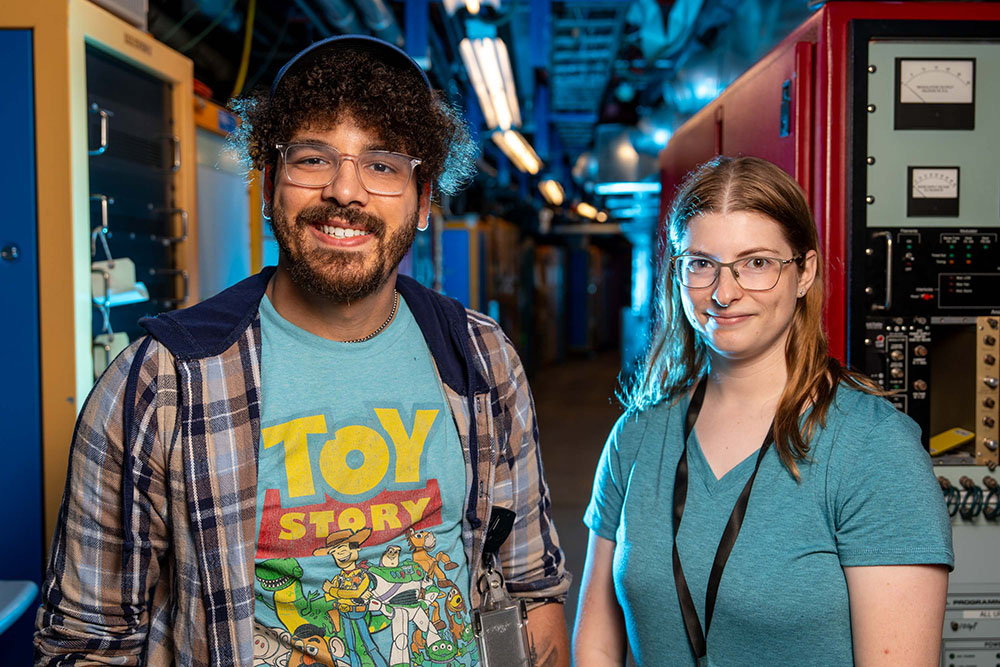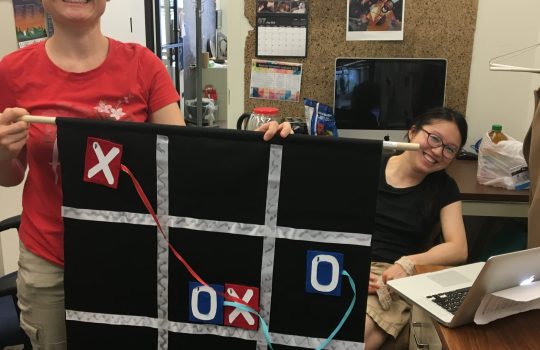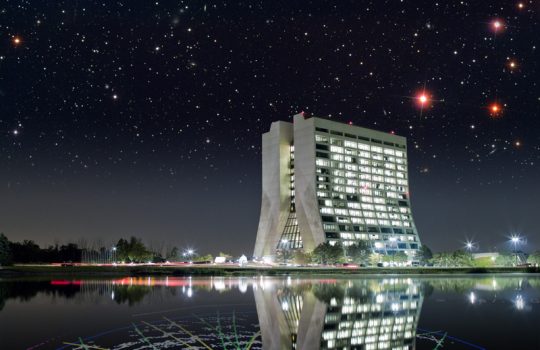When KeAndre Worthy began studying advanced electronics at the College of DuPage, he didn’t expect his career trajectory to lead him to the U.S. Department of Energy’s Fermi National Accelerator Laboratory. Through the Particle Accelerator Capabilities Modernization Apprenticeship Program — a pilot traineeship between Fermilab and the College of DuPage — Worthy found his path as an electronics technician in Fermilab’s Booster Accelerator Group.
Now, when I go to the lab, technical work feels intuitive because of the practical experience and knowledge I gained.
KeAndre Worthy, electronics technician
In his role, Worthy works on control systems that support the laboratory’s booster particle accelerator, troubleshooting components for the system. His success demonstrates how community college partnerships with Fermilab can launch students into meaningful technical careers.
“All of my coursework at the College of DuPage helped me feel comfortable with oscilloscopes and circuit board analysis — which all came together during my internship through PACEMAP,” said Worthy. “I remember sweating over simple concepts when I first started school. Now, when I go to the lab, technical work feels intuitive because of the practical experience and knowledge I gained.”
Accelerating Careers
Susanna Stevenson, a high-level radiofrequency engineer at Fermilab, shares a similar start to her career. She began her journey at Kishwaukee College, where a professor inspired her to pursue engineering. “The Community College Internship I did with Fermilab opened the door for me to go further,” said Stevenson. “Being an intern at Fermilab was overwhelming at first, but it gave me the foundation I needed.”
Stevenson completed her electronics technician associate degree at Kishwaukee and then transferred to Northern Illinois University to earn a bachelor’s in electrical engineering. She is now pursuing a master’s degree in radiofrequency engineering at the University of Illinois Chicago.

“I never regretted doing community college first,” Stevenson said. “It was really important and beneficial. When I started my engineering degree, I already knew how electronics worked from hands-on experience. My bachelor’s degree helped fill in the gaps in my knowledge.”
She participated in the DOE’s Community College Internship program, working on electronics and computing. That internship gave her the confidence to apply to Fermilab, where she now designs, tests and assembles components for Fermilab’s radiofrequency systems that accelerate particles in its accelerator complex.
“Working at a national lab as an intern gave me the confidence to know I could do this work,” said Stevenson.
Internships that launch technical careers
The PACEMAP pilot program and the lab’s involvement with the Community College Internship program are part of Fermilab’s broader efforts to build bridges between national labs and local two-year colleges. These programs are designed to align research roles with students’ coursework and schedules, providing hands-on training in real-world lab environments.
“We aim to connect community college students with opportunities by instilling the skills, training and safety culture needed to become a full-time hire in a technical field,” said Amanda Early, the STEM Ambassador in Fermilab’s Workforce Pathways and Partnerships Office. “I went to community college myself and know how transformational these experiences can be.”
Expanding access through educational innovation
Fermilab is also supporting curriculum innovation across campuses. In collaboration with Sheela Vemu, an associate professor of biology at Waubonsee Community College, instructional modules called COMPASS — Career Opportunity Modules Promoting Academic STEM Success have been developed.
COMPASS offers plug-and-play lessons to help community college students and faculty better understand the role of national laboratories, offering an introduction to DOE science and internships in accessible, course-integrated formats.
“Many students don’t see themselves working at a national lab — they don’t know these spaces are for them,” said Vemu. “These modules show that science isn’t just for people with Ph.D.s. It’s relevant to our everyday life, community and future.”
As pilot testing of the modules begins at Waubonsee with plans to expand nationally, early responses have been encouraging.
“We recently received a note from the president of Waubonsee thanking us for collaborating. That kind of recognition shows how real the connection is between Fermilab and community college faculty and students,” said Cortez Watkins, Sr. Workforce Pathways and Partnership Liaison.
Both Susanna and KeAndre reflect the strength of that connection. Their journeys — from community college classrooms to careers at a leading national laboratory — highlight the growing impact of these partnerships.
“We don’t know where our next best idea or colleague might come from,” Watkins added. “It might be someone from a community college.”
Fermi National Accelerator Laboratory is America’s premier national laboratory for particle physics and accelerator research. Fermi Forward Discovery Group manages Fermilab for the U.S. Department of Energy Office of Science. Visit Fermilab’s website at www.fnal.gov and follow us on social media.



